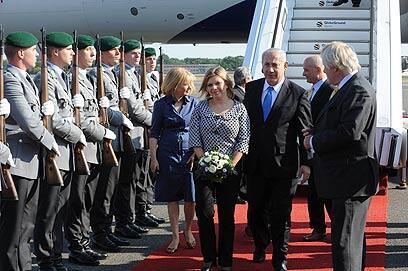BERLIN - A senior state official accompanying Prime Minister Benjamin Netanyahu on his visit to Berlin said Wednesday night that Germany carries a lot of weight in the attempts to advance the release of kidnapped soldier Gilad Shalit and that Israel welcomes this involvement.
Netanyahu is scheduled to meet with German Chancellor Angela Merkel on Thursday. The prime minister and his entourage refused to provide details on the secret moves aimed at securing the Israeli captive's release.
"As in all my meetings with heads of state, I will raise the Gilad Shalit issue," Netanyahu said while briefing reporters accompanying him on his trip to Europe, but refused to elaborate on whether he was optimistic or pessimistic over possible progress made in the process.
Netanyahu and his wife land in Berlin (Photo: Amos Ben Gershom, GPO)
The recent numerous visits to Egypt conducted by political and military Hamas leaders, as well as the entrance into the game by a German negotiator, suggest that the Shalit deal is on its way to completion," Mustafa Sawaf wrote.
Sawaf, who is considered a Hamas affiliate, claims a German negotiator has become involved in the proceedings in an Egyptian effort to press Israel into reaching a deal soon.
Meanwhile, Shalit's father Noam met with Hagai Hadas, Israel's representative to talks on his son's release from captivity. The meeting was described as an "update".
The Shalit campaign headquarters stated that the meeting had been scheduled in advance, and that it was related to daily updates and not "developments reported by the media".
A key axis
The prime minister said after arriving in Berlin, "Every time I come to Germany I commend the excellent relationship we have with its government, not just because of the present and future, but also because of the past."
This is Netanyahu's first visit to Berlin as prime minister. Immediately after landing in the capital, he met with German President Horst Köhler and used the phrase "Judenstaat" (the Jewish state) in order to define his expectation from the Palestinian to recognize Israel as the Jewish people's nation state.
Netanyahu and his wife Sara are expecting an emotionally charged day on Thursday. In the morning, the prime minister will receive the original plans of the Auschwitz concentration camp at the Exel-Springer publishing house. In the afternoon, he is scheduled to visit the Wannsee neighborhood, where he will tour the house where Hitler and senior Nazi officials discussed the implementation of the "final solution" for Europe's Jews in 1942.
This will be the first visit by an Israeli prime minister to the Wannsee Villa museum. Netanyahu is accompanied on this visit by Minister Yossi Peled, a Holocaust survivor. Another person who will join the prime minister and his wife in Wannsee is the pilot of the plane who took them from London to the German capital, a son of Holocaust survivors, who said following the flight, "I am proud to have flown the Israeli prime minister to Berlin."
Netanyahu's meeting with Merkel is expected to revolve around the German demand for a settlement freeze, but the two are also expected to discuss the Israeli demand for sanctions against Iran over its nuclear program.
The two leaders are expected to hold a joint press conference following the meeting. A senior state official defined the meeting with the chancellor as "important, in order to resume German's role as a key axis, both in the negotiation moves in the Middle East and in the actions required against Iran's nuclearization process."


